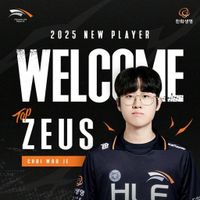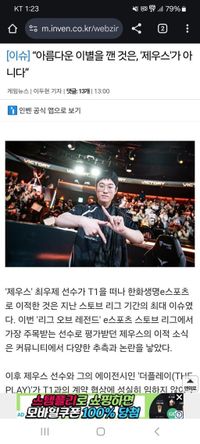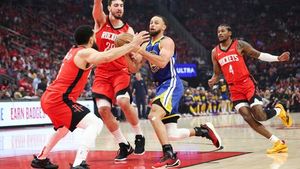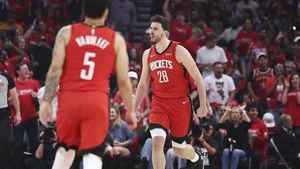In the rapidly evolving world of eSports, Choi 'Zeus' Woo-je's transfer from T1 to Hanwha Life Esports has sparked intense debate and speculation, becoming one of the most discussed events of the ongoing standoff between teams and players. This shift has brought various perspectives into the limelight, particularly regarding the roles of players and their agencies in contract negotiations.
Recently, T1's CEO, Jo Ma-sh, expressed dissatisfaction with Zeus's agency, 'The Play', during an AMA (Ask Me Anything) session on a public platform called FM Korea. According to Ma-sh, the agency's lack of reciprocal offers during negotiations contributed to a problematic environment. He noted, 'The agency prioritized financial gain over the player's career development,' creating a perception that the relationship between the player and T1 was marred by misunderstandings and poor handling.
The core of the controversy lies in allegations made by The Play about speculation regarding Zeus's departure. 'Ever since we filed a complaint with the eSports Fair Committee last November, slanderous rumors about Zeus have persisted,' Kang Beom-joon, the representative of The Play, explained. This statement sheds light on the weight of public perception in the negotiation process, particularly when informal commentary often overshadows formal proceedings.
Adding fuel to the fire, reports emerge indicating that Zeus's transfer agreement came without any commission for The Play, as their commission rate was set at 0%. This unique situation raises questions about why the agency would choose to forego monetary gains in a high-stakes transfer, casting doubt on accusations of prioritizing financial interests.
The tension reached its peak around November 19, 2024, when Hanwha Life Esports set a deadline of 3 PM for Zeus and The Play to respond to their proposal. T1's final offer had been made much earlier that day at 1:32 PM, but allegedly, the terms presented by T1 were viewed as 'unacceptable' relative to Zeus's market value. Kang Beom-joon remarked that T1's initial offer failed to reflect the contributions of a player who had led the team to a Worlds Championship title.
In the scrambling hours leading up to the 3 PM deadline, reports indicate that T1's negotiator attempted to establish direct contact with Zeus. Conversations unfolded, with T1 requesting Zeus's address shortly before the deadline, but the agency cited Hanwha's terms, emphasizing the critical timeline they were operating under to finalize their deal.
Interestingly, tensions rose when it came to the 'deadline' issue. Zeus was said to have delayed the deadline by 30 minutes in the hopes of reconciling terms with Hanwha Life Esports. Still, ambiguity surrounds who emphasized the need for time, with suggestions that T1's negotiator had been the one to propose the finality of the offer in the first place.
Ultimately, the negotiations culminated in a failure to agree on the contract period, which led to Zeus signing with Hanwha Life Esports. As conversations fell short, both sides recognized an opportunity lost.
'He wanted to stay with T1 and continue as their top laner if we could agree on a shorter contract period,' Kang asserted. However, the inability to converge on terms resulted in the player's departure — a scenario many fans consider disheartening given Zeus's robust history within T1.
The fallout has not only been personal but systematic. Jo Ma-sh criticized the agency’s tactics, suggesting that their approach had facilitated an adverse outcome in negotiations. 'The player’s market value was not adequately addressed, and the agency failed to engage sincerely in discussions,' he summarized, aligning himself with a statement that many in the community echo.
As the dust settles, one wonders how this incident will influence future transactions in the eSports realm. Will players be wary of agency involvement, or will teams reassess their negotiation strategies? As discussions around Zeus's transfer continue to evolve, the lingering question remains: what will become of the relationships developed throughout his career and the future landscape of player-agency dynamics?
The complicated narrative surrounding Choi 'Zeus' Woo-je may appear to be a standalone tale, yet it represents broader trends in the eSports industry regarding agency roles, team dynamics, and the importance of mutual understanding and transparent communication in contractual negotiations. As the scene unfolds, one prediction seems clear — both agencies and teams must learn from these experiences to cultivate better relationships moving forward.






